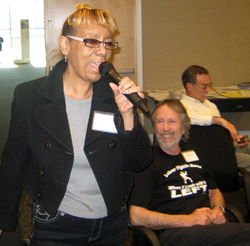When I told friends I was on my way to the Labor Campaign for Single-Payer conference, held last weekend, they all said, “I bet that’ll be a bunch of long faces.” I predicted not—these were people who’d always known the health care reform debate in Congress would come up short.
Even single-payer advocates didn’t know just how bad the bills would be, of course, but we knew that when the dust settled the insurance companies would still be in charge. “We’re making progress on single payer—the corporations want to make you the single payer,” said Chris Townsend, UE political director.
Yet the 124 delegates to the March 5-7 conference in Washington were upbeat. Despite the seemingly imminent passage of what campaign coordinator Mark Dudzic called a “bound-to-fail, toxic” proposal, they could point to big strides in popularizing the idea of Medicare for All:
- hundreds of presentations made to union and community groups, thousands of one-on-one conversations, and scores of demonstrations, produced by sturdy local coalitions like the Labor Taskforce for Universal Healthcare in Los Angeles and the statewide Healthcare4AllPa in Pennsylvania.
- attendance at town hall meetings last summer to confront Tea Party-ers
- dozens of arrests at insurance companies and other venues around the country
- 74 resolutions in favor of single-payer sent to the AFL-CIO convention last September, resulting in a pro-single-payer resolution there
- state single-payer bills in play this year in Pennsylvania, California, and Vermont.
Participants wasted no time moaning about the fact that most of their union leaders ignored single payer and set their sights on a public option that was presumed more viable. Instead they talked about how to pass state-level bills and shared specific tactics.
They saw a costing chart that the Maine AFL-CIO uses as a teaching tool to illustrate the huge cost savings of single-payer. They heard about the California School Employees Association’s member-to-member education program and about the plan to put a single-payer measure before California voters in 2012.
And they passed a resolution to pursue more resolutions: they will follow the lead of the Maine AFL-CIO in calling on the national AFL-CIO to take up the single-payer crusade with a commitment of resources no less than the resources devoted to this year’s frustrated effort.
The Maine federation noted, “Had we collectively pursued such a strategy after the last healthcare policy failure in Congress in the mid 1990s—by staking out a strong single payer position, educating our membership as deeply as possible, pushing for political support of single payer legislation and sticking with that approach for the last fifteen years—we would be in a much stronger position today.”
Although the activists are looking long-term, they’re not planning to wait, either. Kay Tillow of the All-Unions Committee for Single-Payer warned folks, “Don’t say ‘it’ll be 10 years before we can look at health care again.’” Michael Lighty, policy director for the California Nurses Association, was one of several who spoke of the need to “win the argument over the role of government.”
Pearls of Wisdom
The most oft-quoted speaker at the conference was Dr. Margaret Flowers of Physicians for a National Health Program, who told delegates to work “outside their comfort zones” to build a movement independent of either party. “Politicians will come to us if we build a strong enough movement,” Flowers said. “We are the ones who determine political feasibility.”
Other quotable moments:
- Larry Cohen, President, CWA: “A year ago we never thought we’d be aiming this low. We thought we were raising money and mobilizing members to go forward—we ended up having to fight the excise tax. But just like in collective bargaining, we have to figure out what we can do with it .... CWA remains committed to single payer.”
- Mark Dudzic: “Labor took a stand at the beginning of this process: for a robust public option, an employer contribution, and no tax on benefits. How’d that work?”
- Michael Lighty: “The public option was just a stalking horse to get labor to support whatever President Obama wanted. Then the public option was removed and labor is still supporting whatever Obama wants.”
- Peter Knowlton, Northeast Region President, UE: “A danger of the current legislation is that it will establish the benchmark that 10 percent of a person’s income should go for health insurance—and we’ll be confronted with that as an assumption in bargaining.”
- Jerry Tucker, UAW, St. Louis: “Some folks are already in a single-payer system—veterans and those on Medicare. We should use them to talk about the advantages of ‘socialized medicine.’”
- Alice Brody, New York Single Payer, Albany: “In our area a lot of groups are what I call SPINO—single payer in name only. We’re creating a packet of specific asks, like coming to their membership meetings to give a presentation.”
- Bob Sisler, Retirees for Single Payer, UAW Local 6000, Michigan: “We have to deal with the shock factor of single payer. When you don’t have good insurance, people have been trained to think it’s your fault you didn’t get the right job, or you didn’t bargain the right coverage. It takes hearing about single payer several times before people understand what it would really mean.”
- Jon Flanders, Troy Area Labor Council, New York: “There was no sense at the gathering that a rerun of the ‘90s is in store, with a decade or more of waiting for another go.”




